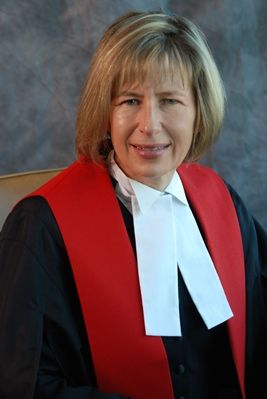
The challenges: Scarce resources; strict time limits
After judging on the Court of Queen’s Bench since 2007, Justice Jo’Anne Strekaf, Law’80, has been appointed to the Courts of Appeal for Alberta, the Northwest Territories, and Nunavut. She says she’s ready for the challenge, and colleagues say her intelligence and analytical skills suit her well for a role focused on questions of law rather than the facts of the case.
“It is a different mindset,” Strekaf agrees. “One of the things I really enjoyed as a trial judge was making findings of fact. Watching and hearing witnesses was interesting and challenging.”
A Queen’s Bench colleague and long-time friend, Justice Karen Horner, says Strekaf will fit right into her new role. The two have shared several experiences since childhood in Regina, Saskatchewan. Both did undergrad studies at the University of Regina, accepted early admittance to law school, graduated at age 22, and began articling with Bennett Jones LLP in 1980.
Strekaf was called to the Alberta bar in 1981. She was an associate and then a partner with Bennett Jones from 1981 to 2007, practising litigation in competition law. She worked on several big cases, such as the ICG-Superior Propane and Air Canada-Canadian Airlines mergers. While partner, she also was involved in running the firm’s legal research group. She earned an LLM from Cambridge in 1986. When she was called to the bench in 2007, she and Justice Horner once again became colleagues.
Justice Strekaf’s family includes three children. Her eldest, Mary, was diagnosed with autism. As reported in Queen’s Law Reports 2013, there was no adequate school for her in Calgary at the time, so Strekaf and her husband, Chris Archer, and a group of other parents started the Janus Academy to provide specialized learning for children with autism from grades one through 12.
“I’ve met people from outside the city who actually moved to Calgary so their kids could be in the Janus program. It’s really, really successful,” Horner says with admiration. “For Jo’Anne to have done that while maintaining a partnership at a very prestigious firm, and accomplishing what she did academically at Cambridge is pretty amazing.”
Another colleague, Justice Rosemary Nation, describes Strekaf as a team player who is very involved in the work of the court, as well as socially. “She was great as a trial judge and she will be excellent on the Courts of Appeal,” Nation says. Horner praises her “prodigious” work ethic.
As a trial judge, Justice Strekaf adjudicated such high-profile cases as the Arthur Kent libel case (dubbed “the Dud Scud lawsuit”) last June. She awarded Kent, a former NBC-TV war correspondent, $200,000 in damages for defamatory statements in a column by Don Martin, then a National Post columnist. The newspaper had given Kent no opportunity to respond to the comments; then it left the column on Postmedia websites for four years.
Despite the media attention around the case and the always acrimonious debate over freedom of the press, Strekaf says she didn’t let herself be distracted. “You can’t get caught up in what other people are thinking about cases,” she says.
Another newsworthy case she tried was Pridgen v University of Calgary in 2010, where she ruled that universities are subject to the Charter. When the university disciplined students for posting on Facebook about a professor, it breached the students’ Section 2 right to freedom of expression.
One of the major challenges Strekaf, and all Canadian appellate judges, is now facing is a backlog in criminal cases that are at risk of being stayed after a 2016 Supreme Court decision in R v Jordan. That SCC decision set hard time limits for getting cases to trial: 18 months for provincial court trials; 30 months for superior court trials. If cases go longer than that, they breach an accused’s Charter right to be tried within a reasonable time under Section 11(b).
“As with any decision, it will take some time for the practical implications to unfold and evolve,” Strekaf observes. “Everybody will have to deal with the fact that this is a significant change in the way criminal matters will go through the system.” Just in November, a first degree murder charge in Ontario was thrown out for violating the time limit. The seriousness of the charge being stayed caused a prosecution and media uproar, proving Justice Strekaf is right about time being needed to absorb such a major change.
“Some of the challenges involve coping with the limited resources available to the parties,” she points out. “I don’t think any one part of the justice system can deal with those kinds of systemic issues on its own; the solution has to combine all aspects of the system. The Crown, defence and the courts all have a role to play.”
In 2013, Justice Strekaf won the H.R.S. Ryan Alumni Award for significant contributions to Queen’s Law, the legal profession and the broader community. To celebrate her award, legal community friends set up an education equity fund in her name at the school. Its income supports a program that hires upper-year law students to tutor first-years. For more information and to make a donation, visit https://www.givetoqueens.ca/project/view/150.
By Jeremy Mutton